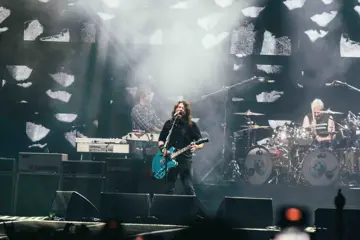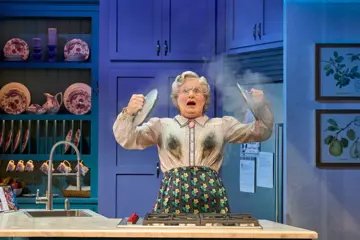You would be hard-pressed to put on an event like Corroboree Sydney and not include Bangarra Dance Theatre. Over almost a quarter century the country's flagship Indigenous arts organisation has effectively redefined what it means to present Australian Aboriginal stories in a contemporary context.
The man at the creative wheel for the last 22 years, Stephen Page, is, as ever, both passionate and philosophical about Bangarra's Corroboree contribution, a collaborative quartet called Dance Clan 3.
Before you get too numerically confused, Dance Clan 1 & 2 happened back in the '90s. Number three is therefore the long overdue continuation of a programme Page created to allow the company's senior dancers to flex their choreographic muscle. This year's version features short works from four of Bangarra's female dancers. “It just felt apt,” Page explains, “The four girls, they were just chosen organically really. People say, 'Why four women?' but I think they were just the four lining up wanting to have the experience.”
Almost inevitably the programme features a quintessentially Sydney story; but one which many Sydneysiders will find uncomfortable. Jasmin Sheppard's Macq delves into the bloody beginnings of indigenous resistance to the conquest of their land. By using Governor Macquarie's diaries as source material, Sheppard's work brings unsettling history and black perspective to the main stage.
Don't miss a beat with our FREE daily newsletter
As Page observes, “The black social movement at that time was pretty amazing, in terms of a line in the sand and ideas about black empowerment, so it's not a time we don't like talking about. So it's totally relevant that it's part of Corroboree because it's such a Sydney story.”
The work also sits at the core of what Bangarra has done since 1989. “It's a great medium, dance, because whenever we wanna put a black social-inspired production out there we're not spoon-feeding,” Page says. “It's a bit more accessible. It spears into the subconscious. But y'know, this isn't the first black social piece we've done so I guess people should know what they might get with Bangarra.”
On a personal note, Page is clearly loving the process of Dance Clan 3. Indeed, the mentoring of indigenous creatives is very much part of the Bangarra mission. “It's been one of the things I've been most proud of,” he declares. “What's been great for me is allowing the senior dancers to move seamlessly through the process into that choreographic storytelling world; y'know, from Frances Rings to Daniel Riley. It's just about nurturing.”
As the four dancers, (Sheppard, Tara Gower, Yolande Brown and Deborah Brown), bring their individual visions to fruition, Page wonders aloud how much of himself is reflected in their work. “If it's not me,” he muses, “it's somehow the spirit of our repertoire that permeates them. I think what's made it a bit more accessible for the girls this time round is that there are 29 works to draw on. That diversity of inspiration has allowed the girls to have a kind of Bangarra creative smorgasbord to play with.”
WHAT: Dance Clan 3
WHEN & WHERE: 20 Nov to 1 Dec, Studio Theatre, Walsh Bay















